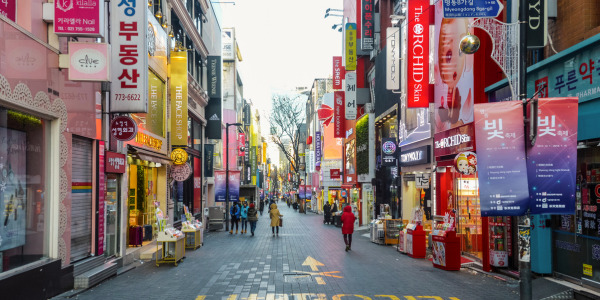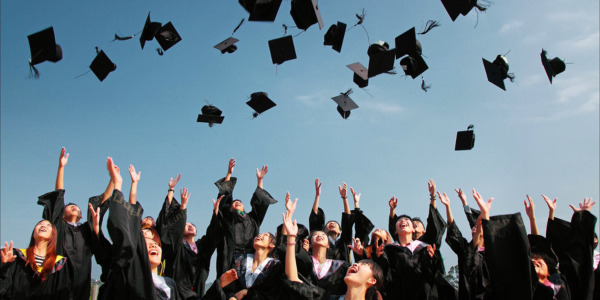Studying in South Korea – Success in the Academic World
South Korea has become a popular destination for international students who want to pursue higher education abroad. The country offers various educational advantages, including quality programs, modern facilities, a rich culture, and attractive career opportunities. This article will explain why studying in South Korea can be an appealing choice for prospective international students.
Why Choose South Korea as a Study Destination?
South Korea has a strong reputation in higher education. The country ranks high on the list of best universities globally and offers comprehensive academic programs. Additionally, South Korea is known for its advanced technology and creative industries, which provide attractive career opportunities for graduates.
Higher Education System in South Korea
The higher education system in South Korea consists of globally recognized universities and other higher education institutions. Universities in South Korea offer undergraduate, master’s, and doctoral programs in various fields of study. They also have innovative curricula and modern research facilities.
Read also: What is the TOPIK Test?
Leading Universities in South Korea
Seoul National University
Seoul National University (SNU) is one of the leading universities in South Korea with a strong reputation in science and technology. SNU offers comprehensive academic programs and has renowned faculty in various fields.
University of Seoul
University of Seoul is one of the top universities in South Korea, known for its programs in business, engineering, and social sciences. The university provides a dynamic learning environment and modern facilities.
Yonsei University
Yonsei University is a leading private university in South Korea with an excellent reputation. The university offers diverse academic programs in various fields of study, including natural sciences, humanities, and medicine.
Korea University
Korea university (UK) is one of the most prestigious universities in South Korea. KU offers a wide range of academic programs in various fields of study, including social sciences, arts, and sciences.
Read also: 16 List of Best Universities in the World in 2023
Admission Requirements
To apply for studies in South Korea, international students need to fulfill several requirements. Some common requirements include online applications, recommendation letters, transcripts, and motivation letters. Additionally, English language requirements such as TOEFL or IELTS scores are also needed. Academic requirements will vary depending on the chosen university and program.
Scholarships for International Students
South Korea offers a wide range of scholarships for international students who want to study in the country. The Korean government scholarships include the Global Korea Scholarship (GKS), which covers tuition fees, living expenses, and health insurance. Additionally, many universities in South Korea provide special scholarships for international students.
Read also: Types of Scholarship Selection and Success Tips for Each Stage
Cost of Living and Accommodation
The cost of living in South Korea can vary depending on the location and chosen lifestyle. However, the cost of living in South Korea is often considered affordable compared to countries like the United States or the United Kingdom. International students can choose between living in campus dormitories or renting apartments off-campus.
Cultural Experience and Social Life
Studying in South Korea not only provides quality education but also rich cultural experiences and social life. International students will have the opportunity to learn about the unique Korean culture, study the Korean language, and engage in various campus activities such as cultural festivals and student clubs.
Read also: Tips for Fluent Korean – Easy Ways to Master Korean Quickly
Career Opportunities after Graduation
Graduates from universities in South Korea have promising career opportunities. South Korea has advanced industries in various sectors, including information technology, entertainment, manufacturing, and finance. Graduates with degrees from top universities in South Korea are often sought after by leading companies in the country. Additionally, South Korea is also a popular destination for professionals in the arts and entertainment fields.
Studying in South Korea isan attractive choice for international students who seek high-quality higher education in an innovative academic environment. With renowned universities, available scholarships, rich cultural experiences, and promising career prospects, South Korea offers ample potential for personal and professional development.
Read also: Fully Funded Scholarships 2023 – Opportunity to Get Fully Funded Scholarships for This Year
FAQ
Do I need to master the Korean language to study in South Korea?
Although many study programs are offered in English, having basic knowledge of the Korean language can be advantageous for everyday interactions and understanding the local culture. However, most universities in South Korea also provide Korean language learning programs for international students.
How can I obtain a scholarship to study in South Korea?
There are various sources of scholarships available for international students who wish to study in South Korea. You can search for Korean government scholarships such as the Global Korea Scholarship (GKS) or explore scholarships offered by specific universities. It is important to check the requirements, application deadlines, and submit complete and timely applications.
Which are the leading universities in South Korea?
Some of the leading universities in South Korea include Seoul National University, University of Seoul, Yonsei University, and Korea University. However, there are many other universities that offer quality academic programs in various fields of study.
How can I prepare the application documents?
Each university has slightly different admission requirements. Make sure to carefully read the application guidelines provided by the universities you are interested in. Generally, application documents include online applications, recommendation letters, transcripts, motivation letters, and proof of English language proficiency.
Is the cost of living in South Korea affordable?
The cost of living in South Korea can be considered affordable compared to Western countries such as the US and the UK. However, the cost of living may vary depending on the location and chosen lifestyle. International students can manage their budget wisely and seek accommodation options that fit their needs and budget.
5 Scholarship Programmes to Study in The Republic of South Korea
International Student Scholarship for Graduate School in the Republic of Korea
Are you eager to embark on an educational adventure in South Korea? South Korea has become an increasingly attractive destination for international students due to its rich culture, delectable cuisine, K-pop phenomenon, K-drama addiction, K-beauty allure, and other fascinating aspects. Studying in South Korea has many benefits and advantages, including internationally recognized degrees, remarkable technological advancements and innovations, affordable living costs, part-time job opportunities to supplement your finances, improved Korean language proficiency, captivating tourist destinations, and a high quality of life.
Undergraduate scholarships make it possible for high school graduates who wish to study in South Korea to realize their ambition. Let’s investigate some of these scholarship opportunities:
1. Undergraduate Scholarship at UNIST
The Ulsan National Institute of Science and Technology (UNIST) is one of the leading public research universities in South Korea, specializing in research in science and technology. UNIST rated fifth in South Korea and 178th worldwide in 2022. The application period for the Undergraduate Scholarship program at UNIST is from January 10 to February 14, 2023, and there are 15 available positions for incoming students. The eligibility requirements consist of:
Applicants who completed primary and secondary school outside of Korea and have never attended a Korean institution.
Foreign nationals who were not born to Korean parents.
This scholarship provides full tuition fee waivers to first-year students with a GPA of 2.0 or higher, full tuition fee waivers to students with a GPA of 3.1 or higher, and a 50% tuition fee waiver to second-year students with a GPA of 2.7 or higher.
Application documents required:
- The first form is a checklist.
- The Form 2 application
- Form 3: Academic details.
- Personal statement and study schedule for Form 4.
- Form 5 is an agreement to verify academic records.
- Transcripts from high school from the past three years.
- Diploma or certificate of high school completion (official letter with the school’s official seal).
- Test results for the English language (IELTS / TOEFL iBT / TOEFL PBT / TOEIC).
- The applicant’s passport photocopy.
- A copy of both parents’ passports or other nationality-indicating documents.
- Additional awards during secondary school.
- Additional high school diploma or college entrance examination certificate.
- Additional standardized test scores and academic certifications.
- Profile from high school (optional).
Available disciplines and majors:
- The natural sciences include physics and chemistry.
- The life and bio sciences include biology and biotechnology.
- Electrical Engineering, Mechanical Engineering, Robotics Engineering, Computer Engineering, Chemical Engineering, Industrial Engineering, Materials Science and Engineering, and Environmental Engineering make up the field of engineering.
- Visual Design and Product Design.
- Economics and Finance: Economics, Finance.
- Computer Science, or IT.
- Business: Administration of Business and Marketing.
- Urban Planning and Interior Design are included in the field of architecture.
2. KAIST Fellowship
Located in Daedeok Innopolis, Daejeon, South Korea, the Korea Advanced Institute of Science and Technology (KAIST) is a national research university. In 1971, the Korean government established KAIST as the first public research institution specializing in science and technology. Undergraduate students who pass the admissions process and are awarded a complete scholarship at KAIST receive full tuition for 8 semesters, a monthly living allowance of 350,000 KRW (approximately $297), and medical health insurance.
The following are the eligibility requirements and application periods:
1. After their first year at KAIST, international students are required to maintain a GPA of 2.7 out of 4.3.
There are three application periods at KAIST: early, regular, and late.
- Early cycle: Applications will be accepted between September 5 and October 21, 2022.
- The application period begins on November 8, 2022 and ends on January 13, 2023.
- Late cycle: Applications will be accepted from 1 March to 26 May 2023.
Documents required include:
Request for application form.
- The recommendation letter.
- High school summary.
- Transcripts from high school and from college.
- English language proficiency examination results.
- Official ratings on standardized tests.
- Copy of the applicant’s passport or identification document.
- Statement of financial assets.
- Awards and distinctions (optional).
Available discipline areas and majors:
- Mathematics, physics, chemistry, and earth science are the natural sciences.
Biological sciences and biotechnology comprise Life and Biotechnology.
Electrical Engineering, Mechanical Engineering, Robotics, Civil Engineering, Chemical Engineering, Aerospace Engineering, Industrial and Systems Engineering, Materials Science and Engineering, and Environmental Engineering are all included in the field of engineering. - Computer Science, or IT.
- Management of business operations.
- Environmental Science and Environmental Studies.
- Architectural design is architectural design.
- Education: Language Studies and General Studies.
- International Relations, Public Administration, and Political Science comprise the field of Political Science.
3. The Korea University Undergraduate Award
South Korea’s Korea University is a prestigious private research institution located in Seoul. Along with Seoul National University and Yonsei University, the university, which was founded in 1905, is widely regarded as one of the top three institutions of higher learning in South Korea. The application periods for available scholarships for the spring and autumn semesters are January and July, respectively. The eligibility requirements consist of:
- The International Education Team manages the qualifications of international pupils (foreign nationals) admitted to Korea University.
- Minimum of 12 credit hours earned at Korea University in the semester under consideration.
- The previous semester had no academic warnings or violations of academic regulations.
- This award provides partial funding and a full tuition waiver. Included among the application requirements are:
Printed version of the submitted online application.
- Personal assertion.
- Academic results.
- Letter of permission.
- Copies of the information pages of the applicant’s and parents’ passports.
- Family tree/relationship document.
- Language proficiency documentation (Korean TOPIK or English TOEFL iBT or IELTS).
- The recommendation letter.
- High school diploma (must be apostille-certified).
- Apostilled high school transcripts are required.
- Official diploma (expected) from high school (must be apostilled).
- Financial statement.
- Maximum of 10 pages (A4, letter size). Statement of portfolio authenticity (specifically for Art and Design applicants).
Available disciplines and majors:
- Mathematics, statistics, physics, geology, and chemistry comprise the natural sciences.
- Biological Sciences and Food Biotechnology under Life and Biotechnology.
Medicine, biomedical sciences, and public health fall under the category of health and medicine. - Electrical Engineering, Mechanical Engineering, Robotics, Civil Engineering, Chemical Engineering, Aerospace Engineering, Industrial and Systems Engineering, Materials Science and Engineering, Environmental Engineering, and Biomedical Engineering are examples of engineering disciplines.
- Information Technology: Computer Science and Data Science.
- Administration of business operations.
- Environmentalism: Environmentalism.
- Architectural design is architectural design.
- Education: Language Studies and General Studies.
- International Relations, Public Administration, and Political Science comprise the field of Political Science.
4. Global Korea Undergraduate Scholarship – University Industry Cooperation (GKS-UIC)
The newly introduced GKS-UIC program, administered by the government of South Korea, invites 100 international students interested in pursuing undergraduate degrees at Korean universities. The objective of the program is to increase awareness of the advantages of studying in Korea and to improve the global competitiveness of Korean universities. Among the benefits provided by this scholarship are:
- The tuition per semester is 5,000,000 won (approximately $4,244).
- A monthly allowance of 500,000 won (approximately $424).
- Accommodation allowance of 200,000 won upon arrival (approximately $170), except for the summer and winter sessions.
- Round-trip airfare (amount indicated is available).
- Medical health insurance premium (average international student insurance premium).
Here are the eligibility requirements:
- Undergraduate students from foreign universities (in ODA countries) that are partners of the Korean Government Invitation Program for Global Korea Scholarships for foreign students. Students residing in Korea are ineligible to participate in this program.
- Minimum cumulative score percentile of 80% on a 100-point scale is required.
- Must have completed two or more semesters.
- Not sponsored by the government of Korea.
- Must possess a foreign passport.
- Must have taken at least one relevant Korean language or Korean culture course (2 or more credit hours).
- Recipients of a scholarship are ineligible for additional grants, including the Korean Government Support Program.
Documents required include:
- Request for application form.
- Personal assertion.
- Study strategy.
- One recommendation letter.
- GKS applicant compliance.
- Self-medical evaluation.
- Family record (must be authenticated).
- Completion or graduation certificate (must be apostilled).
- Certificate of Korean or English language proficiency (optional).
- Copies of any accolades or certificates (optional).
- (Optional) A copy of the applicant’s passport.
Available disciplines and majors:
- The study of biology and biotechnology.
- Engineering: Electrical Engineering, Mechanical Engineering, Robotics, Computer Engineering, Chemical Engineering, Industrial Engineering.
- IT: Computer Science, Data Science, Artificial Intelligence, Information Systems, Information Technology.
5. Global Korea Undergraduate Scholarship
The South Korean government administers the GKS program to provide international students with the opportunity to pursue advanced studies and to promote international educational exchange and international affinity. Among the eligibility requirements for this scholarship program are:
- Neither applicants nor their parents may have Korean citizenship.
- The applicant must be in excellent mental and physical health for an extended stay.
- At the time of enrollment, applicants must be under 25 years of age (undergraduate).
- Completed or on track to complete elementary, intermediate, and high school formal education.
- The application period is open until October 6, 2022, and the scholarship is entirely endowed. Applicants must compile the following materials:
Request for application form.
- Personal assertion
- Study strategy.
- The recommendation letter.
- Health examination.
- Foreign nationality documentation, including parents.
- These are transcripts.
- The award of a degree.
Aspiring students, you have numerous options and opportunities available to you. Maintain your enthusiasm and make your aspirations come true!






